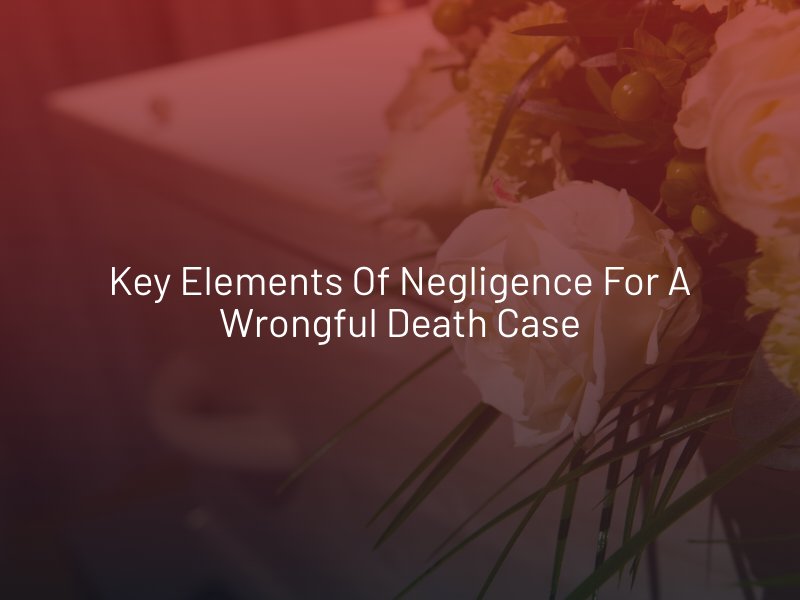Phoenix Wrongful Death Lawyer
If you have lost a loved one due to someone else’s negligence or wrongdoing, you may be entitled to compensation through a wrongful death claim. Contact Harris & Harris Injury Lawyers today to schedule a free consultation with our experienced Phoenix Wrongful Death Lawyer.
Why Choose Harris & Harris Injury Lawyers
We stand by individuals who have suffered the loss of loved ones due to wrongful death incidents. Our mission is to deliver unparalleled legal representation and outstanding service to each client by:
- Providing you with the compassionate support and aggressive representation you need to seek justice for your loved one and family.
- Possessing the insight to precisely evaluate your wrongful death claim’s worth, with our over two decades of experience.
- Devoting thorough attention to your case, striving to secure the maximum compensation possible.
What Are The Leading Causes of Wrongful Death in Arizona?
Wrongful deaths can occur due to various circumstances, but some of the leading causes in Arizona include the following:
- Car Accidents: Traffic accidents, including collisions involving cars, trucks, motorcycles, bicycles, and pedestrians, are a significant cause of wrongful deaths.
- Medical Malpractice: Negligence or errors by healthcare professionals, such as doctors, nurses, or hospitals.
- Workplace Accidents: Fatalities resulting from workplace accidents, such as construction site mishaps, industrial accidents, or incidents involving heavy machinery.
- Defective Products: Wrongful deaths can occur when individuals are killed due to defective or dangerous products, including faulty auto parts, pharmaceuticals, medical devices, or consumer goods.
- Premises Liability: Property owners or managers may be held responsible for wrongful deaths caused by hazardous conditions on their premises, such as slip and fall accidents, inadequate security leading to assaults, or building code violations resulting in structural collapses.
- Drowning and Recreational Accidents: Arizona’s warm climate and abundance of recreational opportunities make drowning and accidents in activities like boating, swimming, or hiking significant contributors to wrongful deaths.
- Criminal Acts: Wrongful deaths can also result from criminal acts such as assault, homicide, or other violent crimes.
Who Can File for a Wrongful Death Claim?
In Arizona, the right to file a wrongful death claim is typically reserved for specific individuals who are closely related to the deceased person. The following parties may be eligible to file a wrongful death claim under Arizona Rev. Stat. § 12-612:
“A. An action for wrongful death shall be brought by and in the name of the surviving husband or wife, child, parent or guardian, or personal representative of the deceased person for and on behalf of the surviving husband or wife, children or parents, or if none of these survive, on behalf of the decedent’s estate.
- Either parent may maintain the action for the death of a child, and the guardian may maintain the action for the death of the guardian’s ward.”
The surviving spouse of the deceased person has the primary right to pursue a wrongful death claim. If there is no surviving spouse, the right goes to the deceased person’s children. If the deceased person had no surviving spouse or children, the right to file a wrongful death claim may pass to the deceased person’s parents.
The family can also choose to have a personal representative of the deceased’s estate file on their behalf. If there are no surviving spouses, children, or parents, the personal representative can pursue a case on behalf of the estate and any beneficiaries.
How Do I Prove Negligence in a Wrongful Death Case?
Proving negligence to hold another party accountable for wrongful death involves demonstrating the following several key elements of negligence:

- Duty of Care: Establish that the defendant (at-fault party) owed a duty of care to the deceased person. This duty typically involves acting reasonably to prevent harm to others.
- Breach of Duty: Demonstrate that the defendant breached the duty of care owed to the deceased. This involves showing that the defendant’s actions or omissions fell below the standard of care expected under the circumstances.
- Causation: There must be a causal link between the defendant’s breach of duty and the death of the individual. In other words, evidence that the defendant’s actions or negligence directly contributed to or caused the fatal incident.
- Damages: Finally, that the wrongful death resulted in damages to the surviving family members or dependents. This may include economic damages such as medical expenses and loss of financial support, as well as non-economic damages like pain and suffering or loss of companionship.
Evidence of Negligence
Successfully proving negligence in a wrongful death case requires meticulous preparation, persuasive presentation of evidence, and skilled legal advocacy. There are several strategies an attorney may use to gather evidence and build a strong case:
- Investigation: A thorough investigation into the circumstances surrounding the death, including collecting witness statements, reviewing accident reports, and obtaining relevant documentation.
- Expert Testimony: Hire the services of expert witnesses, such as accident reconstruction specialists, medical professionals, or forensic experts, to provide testimony and analysis supporting the claim of negligence.
- Documentation: Compile documentation supporting the claim, including medical records, videos and photographs of the accident scene, financial records of the deceased to establish economic losses suffered by the survivors, and any other relevant evidence.
- Prior Incidents or Complaints: Information about any prior incidents, complaints, or safety violations involving the responsible party or entity may help establish a pattern of negligence or misconduct.
Gathering the right types of evidence is crucial to building a strong and persuasive case.
What Are The Statutes of Limitations for Wrongful Death in Arizona?
In Arizona, the statute of limitations for filing a wrongful death claim is generally two years from the date of the individual’s death, according to A.R.S.§ 12-542:
“Except as provided in section 12-551 there shall be commenced and prosecuted within two years after the cause of action accrues, and not afterward, the following actions:
- For injuries done to the person of another when death ensues from such injuries, which action shall be considered as accruing at the death of the party injured.”
This means that legal action must be initiated within this time frame to preserve the right to seek compensation for wrongful death. There are limited exceptions to this law.
Contact Our Phoenix Wrongful Death Attorneys Today
At Harris & Harris Injury Lawyers, our compassionate and experienced Phoenix Wrongful Death Lawyer is dedicated to helping families seek justice and compensation for their losses during this difficult time. To arrange a free consultation today, call (702) 620-9871 or message us online.


